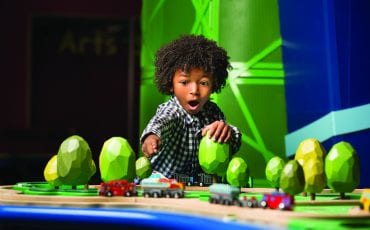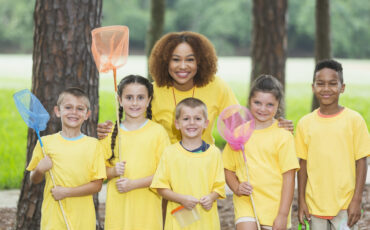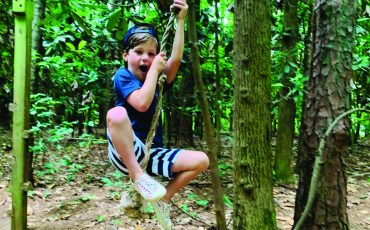Autism Q&A With Kate Swenson

Kate Swenson, creator of the blog “Finding Cooper’s Voice,” wrote “Forever Boy: A Mother’s Memoir of Autism and Finding Joy,” which will be released on April 5. In the book, Swenson chronicles her family life after her son Cooper was diagnosed with severe, nonverbal autism. It is an eye-opening and inspirational look into the world of autism. Atlanta Parent spoke with her about her advice to parents of children with autism spectrum disorder (ASD).

AP: In the book, you talk about the struggle to get your worries about Cooper acknowledged. Has autism awareness made being taken seriously as a parent easier?
KS: I think it was exceptionally hard because it was my first child. I had been around children my whole life. I started babysitting at age 11; I nannied; I worked at camps. I love, love kids. And I was still completely thrown for a loop because I wasn’t able to have that point of reference. My fourth is 9 months old, and I would know now after having four kids what developmental milestones should look like. Autism is more understood now than it was 11 years ago. But there’s still a long way to go. I hear from parents every day who are going to the doctor, and the doctor says, “Let’s just wait until they’re 3,” or “Let’s just wait until they’re in kindergarten.” Early intervention is important, and we kept hitting those roadblocks with Cooper.
AP: Are there common misconceptions you deal with regarding autism?
KS: My son is nonspeaking, which means with his diagnosis, he is unable to communicate verbally. A lot of people think nonspeaking means non-thinking, which is a sad, hard misconception. Cooper is a smart kid. He has a lot of thoughts, and he wants to share his thoughts, just in his own way. When I say, ”Just ask him,” people get nervous, or they think he’s deaf, and they speak really loud, but he can hear you just fine.
People also think people with disabilities don’t live full amazing lives just because they don’t do things most kids do – they might not be able to drive or have a job. Cooper is still going to have a really full life however he chooses to live. So many people think you need to make a million dollars or have a big house, but even if he doesn’t do those things, he’s still going to be great.
AP: What advice do you have about finding a community or creating a support system?
KS: It is the most vital thing you can do as a parent of a child with disability. Find other families with disabilities like yours. I started Coop’s Troops online. It’s mostly moms, and every day, we ask questions and Zoom and chat and laugh and cry in this judgement-free, shame-free space where don’t have to explain ourselves or defend ourselves. I don’t think there would have been a book if I had a support system earlier. We were made to feel like we had the only child with autism, and there were a lot of barriers to connecting with others. Being online is a blessing, and it is definitely vital for moms, dads, siblings, the whole family unit.
AP: How can parents of children with autism learn to advocate for their child?
KS: I try to write a lot about the struggles I had at the beginning. I was scared to speak up. I grew up believing doctors are always right, and they’re going to help you, and teachers are always right, so you should fall in line. But I had this child who I wasn’t getting the right answers for. The first time I had to tell a doctor “I think you’re wrong,” I was practically crying. Do your research. Write down what you’re seeing, so you can explain it in a calm and rational way. Connect with other parents who have done this before. I looked to parents whose children were in their 30s for help to try and get my advocacy shoes on.
AP: How can you maintain self-care or making yourself or your spouse a priority when parenting a child with autism?
KS: It really took a toll on our marriage. We had no help, and we didn’t prioritize ourselves at all. A lot of couples really struggle with that. It goes back to you can’t pour from an empty cup. There is pressure to be caregivers forever, to be strong and healthy to take care of our kids, and that includes mental health. Find another family to trade babysitting with, find respite services, and look for resources in your community. Siblings of children with autism tend to be great babysitters, and you can also look into college students who are learning speech therapy or special needs education who can help. You have to prioritize yourself because you cannot burn out.
AP: What other advice do you have for parents of children with autism?
KS: It is so important to maintain hope. There’s going to be a lot of people who tell you the things your child may not ever do, and that’s hard to hear. You’re going to reach a lot of dead ends. We were told Cooper had the most severe case of autism his social worker had ever seen. But he’s growing up, and he’s figuring out this world. The child you have now won’t be the child you have three, five, 10 years from now. Try to maintain hope. Really believe in your child. When a person is diagnosed with a disability of any kind, they’re put in a box, and people think certain things about them. But there’s no timeline. Cooper is still learning things.
AP: What advice do you have for parents of children without autism who want to be a better friend or advocate?
KS: To teach their children kindness. I know it sounds so simple but teach kindness. It comes out of your children at school or in sports. It’s the most important thing I do with my 9-year-old: say hi, smile, be friendly, wave. If parents are afraid, I see it in their children as well. People fear differences with any type of disability. People think different is bad, but it’s just different. It’s taken me a lot of years to understand that. I always welcome questions. Kids aren’t afraid to ask questions; parents are. If I educate a child, they’ll go home and educate their parents. Be kind – I know what Cooper’s going to do, but I don’t know what others are going to do. It can feel like we’re walking on eggshells because we never know what other people will say or do. By reading books like mine, you can be better about understanding and accepting autism.
Find more information about Swenson and her family at findingcoopersvoice.com.







